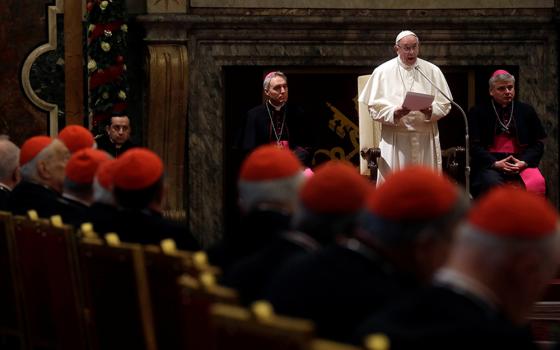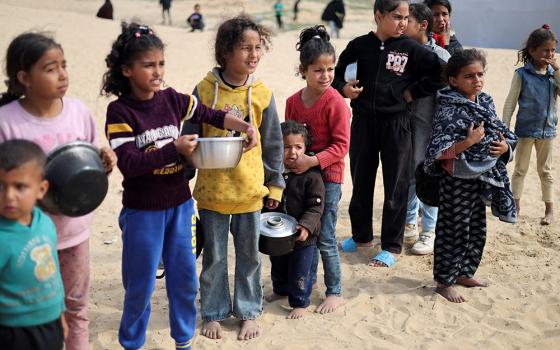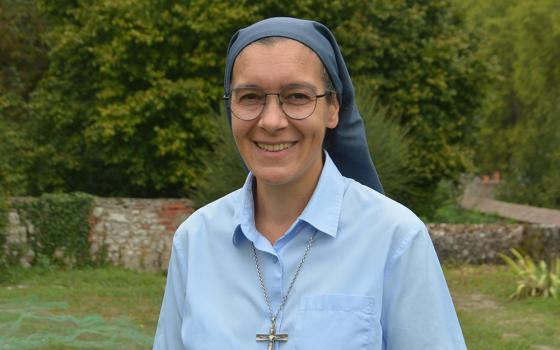
Women: Birthing justice, birthing hope. Part 5 of 12
Catholic organizer Melody Gonzalez helped win farm worker-led campaigns to force McDonald’s, Burger King, Taco Bell, Subway and other major fast food chains to guarantee fair wages and rights for those who pick the produce these food giants buy. Whole Foods has come aboard, too. The farm worker-led Coalition of Immokalee Workers is poised to move from sector to sector, corporation to corporation, until the human and labor rights of those who toil in the fields are respected. Only then can we truly have a sustainable food system.
By Melody Gonzalez
IMMOKALEE, Fla. -- Farm work is very dignified work, but people are not getting paid what they deserve or being treated like full human beings.
My grandfather always went back and forth between Mexico and the United States, working mostly in agriculture. Meanwhile my dad was back home in Michoacán, working to support the rest of the family, since he was the oldest of nine children. He only got to go up to the sixth grade, and even most of the time he was supposed to be in school he was working. When my dad finally turned 18, my grandfather brought him over. They worked in agriculture together, mostly picking raspberries and cucumbers. As a child I remember my dad always saying, “Who is the one who has to get up so early to break his back? Those damned Americans don’t want to do this work, and look how they pay us to do it.”
My grandma had instilled in me to have a strong faith and to believe that we’re all children of God. I have diaries from the third grade that were always about God and wanting peace, justice, and the poor getting out of poverty. Later, in high school, I started reading about the Zapatistas and NAFTA, and I started questioning more and more. Then my sophomore year at the University of Notre Dame, through a service learning seminar, I went on a trip to Immokalee, Fla., that was focused on farm workers. I wanted to go especially because of my dad’s experience.
On the Wednesday during that trip we went to the fields and picked tomatoes. It was incredibly hot, so hot I felt chills all through my body. I remember being out there and thinking that this was the kind of work my dad did since he was a little boy. I thought, “We’re the people of the sun, and here we are breaking our backs under the hot sun.”
That night we were very tired, and our backs ached and our hands were black. And we went to the Coalition of Immokalee Workers’ office for the weekly community meeting. That was a powerful experience, very inspiring. I saw those tired faces that reminded me of my dad and all my family. But they were talking about how they were going to change this and end the exploitation.
A friend from Notre Dame who was working in Immokalee had been saying to me, “I think it would be a really good experience for you to do faith-based organizing. You did go to Notre Dame. You are Catholic.” Now I’ve been in Immokalee for three years, helping faith-based people, students, and youth understand how they’re connected to farm workers, and then giving them ideas as to how to take action and be a part of this movement.
Ultimately the problem in the agriculture industry is the imbalance of power. People don’t trust that farm workers can defend themselves and speak for themselves. You can pass laws, you can have enforcement codes, but if the workers are not a part of that enforcement, it’s all doomed to fail. Unless the workers are in a position of leadership where they are the ones deciding what the problems are and what they think the solutions are, then you’re not going to be able to impact systemic, long-lasting change.
The Coalition of Immokalee Workers’ approach is that the workers themselves come together to analyze what the different problems are, and then attack the root of the problems and not just the different consequences. Yes, pesticides are a big problem, for example, but at the root is this imbalance of power. It comes down to the power of the people who are most affected saying what their human rights are.
And today the farm workers’ situation is changing. This change is connected to something bigger than just the agriculture industry. It’s part of a bigger movement against this oppressive system. And we’re a part of that world that, like the Zapatistas say, values humanity over profits. We’re a part of that history, a part of that vision.
| About the "Women: Birthing justice, birthing hope" series
Among income inequality, seemingly endless wars, and debilitating climate change, it is difficult for many to imagine a path to a better way. In fact, throughout the industrialized North and the global South, solutions to these great challenges are in various stages of construction -- and much of the lifting is being done by women. Grass-roots women’s movements -- progressing often almost without money or access or institutional power -- are emerging and offering alternative and empowering visions. The above is part of a series, titled "Women: Birthing justice, birthing hope," which will appear in NCR by writer and organizer Beverly Bell, coordinator of Other Worlds. She features empowered women who offer alternative visions as they birth a new and more just world order. Seven of the articles in this series are available in a 2010 Lenten booklet, Cry Justice! Cry Hope! with additional reflections by Sister Joan Chittister. Click here to order. All the stories from the "Women: Birthing justice, birthing hope" series
|







